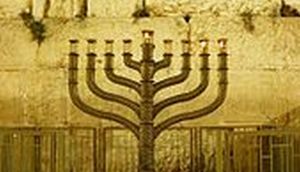“Scholars debate the historicity of the Jewish miracle, but ours is here for everyone to see.”
 Ramallah, December 6 – Curious and inspired pilgrims are streaming to the Palestinian administrative capital to set eyes on a development appropriate for the Hanukkah season: President Mahmoud Abbas, whose four-year term should have expired in 2009, is still in office, a phenomenon that recalls the miraculous miracle of the oil that Hanukkah celebrates.
Ramallah, December 6 – Curious and inspired pilgrims are streaming to the Palestinian administrative capital to set eyes on a development appropriate for the Hanukkah season: President Mahmoud Abbas, whose four-year term should have expired in 2009, is still in office, a phenomenon that recalls the miraculous miracle of the oil that Hanukkah celebrates.
Hanukkah, meaning inauguration, commemorates the miraculous burning for eight days of a jar of oil sufficient for only one. The ancient Jews fighting the Seleucid Empire and its local loyalists managed to oust the Hellenist forces from Jerusalem and set about rededicating the sanctuary for divine service. In the Talmudic account, the last remaining flask of unsullied olive oil lasted long enough for new oil to be pressed and brought to Jerusalem. But whereas earlier sources such as the book of Maccabees, and the first-century works of Josephus, give no mention of the oil, the modern instance of Abbas’s four years miraculously stretching to more then ten has been amply documented by contemporary writers.
Tens of thousands of visitors from all over the world have flocked to Ramallah to witness the ongoing miracle, which shows no sign of letting up. The longer it persists, say observers, the more impressive the phenomenon, a trend that Palestinian tourism officials hope will bring even greater numbers of pilgrims. “Abu Mazen has been in office ten-and-a-half years,” noted Palestinian Authority Minister of Tourism Yusurp Deir Yahud, using Abbas’s popular nickname. “The greatness of this miracle grows by the day, for who would think that four years would last more than twice as long as four years?”
Some pilgrims were even more enthusiastic. “This goes to show ho much more authentic and legitimate the Palestinian narrative is than the Zionist fabrications,” said Aifeel Infiryer, visiting from Egypt. “Scholars debate the historicity of the Jewish miracles, but ours are here for everyone to see. Also, theirs lasted only eight days, while ours has lasted far, far beyond that.”
Tourism and economic officials remain unsure how to capitalize on the steady, but relatively modest, influx. “There are conflicting approaches to this question,” explained Deir Yahud. “Some of us favor the establishment of a holiday to compete with, and of course overshadow, the Jewish observance of Hanukkah, since claiming Jewish cultural phenomena as Palestinian has a long, established tradition: Rachel’s Tomb, the Temple Mount, Joseph’s Tomb, the Tomb of the Patriarchs – basically the entire country. The technical difficulty in that is that the Muslim calendar is exclusively lunar, so it would only coincide with, and overshadow, Hanukkah, every so often. Personally, I favor a monthly observance of rampaging through Jewish communities and setting them alight.”
“That should call to mind the way Jews were treated in Europe before they came here, where they don’t belong,” he added.




